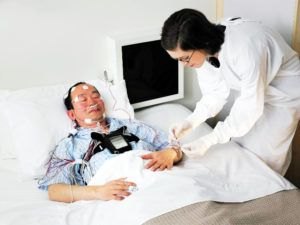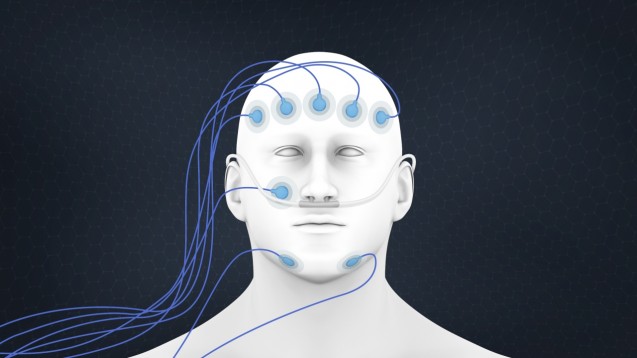What are the varying Sleep Study options and differences?

Level 1 Sleep Study
This test is known as the diagnostic polysomnography test (i.e. the gold standard in sleep testing). The overnight polysomnogram (PSG) determines the cause of excessive daytime sleepiness and diagnoses sleep disorders. Example are sleep apnea and periodic limb movements during slumber. When someone is doing this sleep test, it will involve: spending a night in a single bedroom in a sleep laboratory with one or more sleep technologists overseeing the test.
A qualified sleep technologist monitors
- brain waves (EEG)
- heart rhythms (EKG)
- breathing patterns
- oxygen levels
- limb movements.
What happens during a Level 1 sleep study?
The entire monotoring session is accomplished with small metal discs called electrodes onto the surface of the skin. This means the technologist attaches electrodes using removable cream/gel and tape. Thus, the electrodes will not pierce the skin.
Next, a person lays in the supine position (on your back) and falls asleep. Also, there is a control area, outside of the sleeping area, where the technologist monitors the procedure.
The technologist will have two or three patients to look after per night. Generally, there will be private rooms with a bathroom in or out of the room. To use the washroom during the night, call for the technologist who will disconnect the person from the recording equipment. Cameras observe your sleep.
During a full sleep study, the staff will monitor all (but it not limited to )
- the sleeper’s brain wave activity
- leg muscle activity
- chin muscle tone
- eye muscle movement
- heart function
- breathing patterns
- blood oxygen saturation.
Level 3 Sleep Study (in-home portable sleep monitoring)
A Level 3 Sleep Test is in a smaller version of the laboratory. It is a portable sleep test performed in the patient’s home. This test screens for moderate uncomplicated sleep apnea. This test is primarily designed to screen out moderate uncomplicated sleep apnea. But the test is not for diagnosing other sleep disorders because of the technological difference between your home and a sleep lab.
You can either pick up the testing device or have it sent to you. The closest sleep lab to you will determine is this is an option for you or not. The accuracy of this option is still being studied.
Finally, talk to your general practitioner about your options for a sleep test.
Next Up: Five types of Sleep Tests.
Questions?
Call 1.877.430.2727 for help.
Last Updated: May 5th, 2024
Edited by Bill Bistak B Sc.,SEO/SEM Spc, CRT
CPAP Clinic – hеаlthсаrе аt уоur hоmе
We ѕеrvе Grеаtеr Tоrоntо Area іn Cаnаdа.
Cоntасt: 1-877-430-CPAP(2727) or іnfо@CPAPClіnіс.са
Looking tо rent CPAP іn Tоrоntо? Thеn vіѕіt CPAPClіnіс.са аnd сhооѕе from a wide rаngе of CPAP nаѕаl masks in Tоrоntо аnd CPAP nаѕаl ріllоwѕ іn Tоrоntо today!

